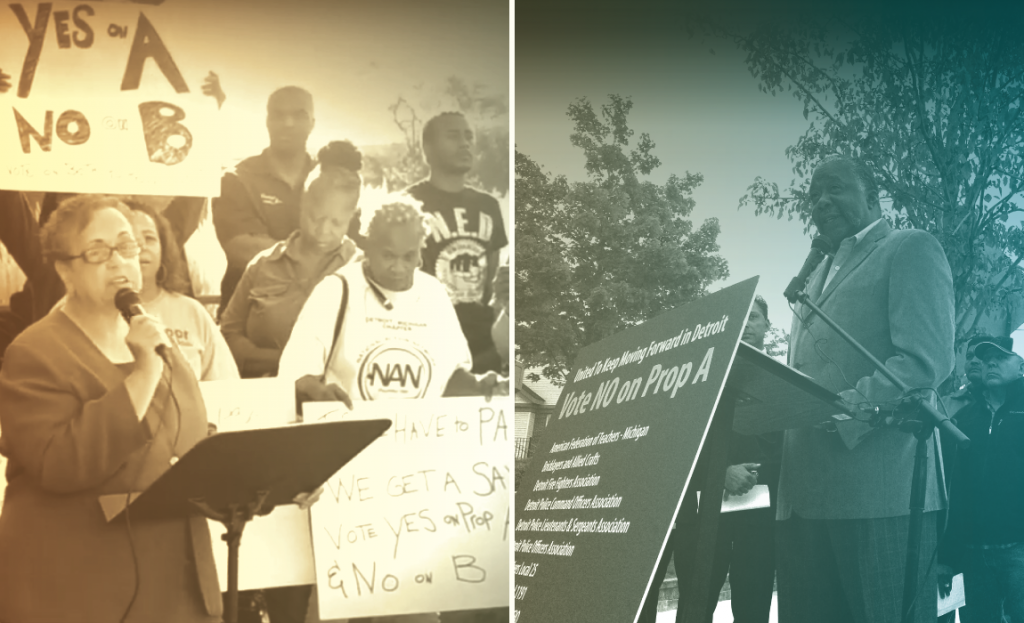Voter’s Guide to Detroit Proposals A, B
Proposals A and B will look pretty much the same on the ballot. But they’re very different. Learn how.

If you live in Detroit, you’ll see two measures on your ballot that look almost identical — Proposals A and B. They’re called “community benefits ordinances.”
The laws would require businesses looking for tax incentives to build in Detroit to meet with representatives from the neighborhoods around the proposed projects to hear their concerns and decide on which community benefits they’ll provide, before getting approval.
But these proposals are competing and, in fact, very different. That’s what we’re talking about today.
How they’re different and why it’s important
Rise Together Detroit submitted Proposal A to City Council to be added to the ballot. Some members were not in favor of it, so they approved an alternative measure to be put on the ballot — Proposal B. Here are some of the main differences.
WHAT SIZE PROJECTS THE LAW APPLIES TO
- A: Applies to projects costing $15 million or more
- B: Applies to projects costing $75 million or more
WHO SIGNS THE CONTRACT
- A: Requires developers to sign a contract with the community representatives.
- B: Does not require developers to sign a contract with the community representatives.
THE CITY’S ROLE
- A: Forbids city representatives from playing an “active role” in community / developer negotiations.
- B: Requires city representatives to take part in community / developer negotiations.
HOW IT’S WRITTEN
- A: Language is loose regarding how community representatives are chosen and what the negotiations process looks like.
- B: Language is prescriptive regarding how community representatives are chosen and what the negotiations process looks like.
What is the community benefits process?
That refers to the developer having to meet with neighborhood representatives to hear their concerns about the proposed project and discuss amenities — like job training programs or environmental protections — the developer will provide in return for building in the area.
What is a Community Benefits Agreement?
A Community Benefits Agreements (or CBA) is a contracts signed by developers and community groups that requires the developer to provide amenities or mitigations in exchange for developing in the neighborhood.
Read the proposals and the stories behind them
Third party opinions
Sandy Baruah | CEO, Detroit Regional Chamber

Detroit business leaders, like Sandy Baruah of the Detroit Regional Chamber, think that if either proposal passes it could pose a threat to the progress of development in the city. And ultimately could wind up costing Detroit the one thing it can’t afford to lose – jobs.
“All across the nation, you’re seeing the streamlining of processes to allow businesses to flourish and develop so jobs can be created so tax revenue can be captured,” says Baruah. “These two proposals take Detroit going in a very contrary direction making it much more difficult for people to come in.”
“Proposal A puts the steering wheel of development in the hands of unelected, unaccountable, very amorphous community groups that would have no parameters as far as what they could negotiate for, for how long they could negotiate … I know very few business that would allow that to happen. It introduces far too much uncertainty into the process.”
Armando Carbonell | Senior Fellow, Lincoln Institute for Land Policy

Armando Carbonell, a Senior Fellow at the Lincoln Institute for Land Policy, says while other cities are trying out individual agreements, he hasn’t seen anything like what Detroit’s considering.
He says voluntary agreements between developers and neighborhood groups have been around since the 2001 Staples Center deal in Los Angeles.
“The reason these have been done outside of any city ordinance is that they can be beneficial to the developer and the community, because they’re taken on voluntarily to smooth the development process,” he says.
“I don’t think, per se, a city ordinance is going to discourage development,” says Carbonell. “I think it obviously depends on how such a program is implemented.”
